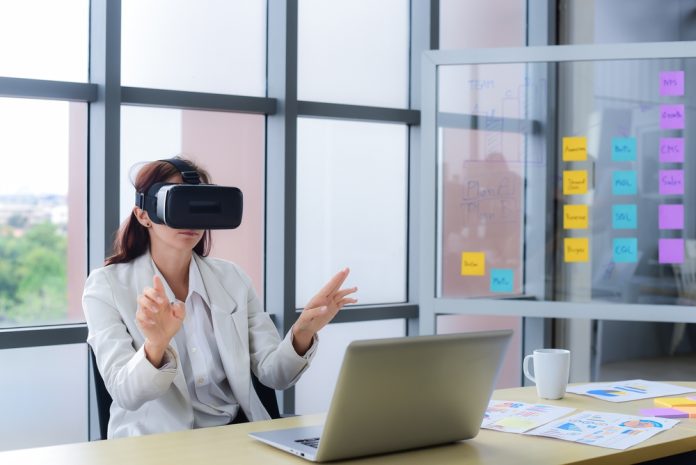
The metaverse, which integrates the virtual and real, is increasingly gaining traction among enterprises. It is underpinned by technologies such as virtual reality (VR), augmented reality (AR), and mixed reality (MR), which are referred to together as extended reality (XR). The XR technologies are projected to enhance more than 23 million jobs globally by 2030.
Human Resources (HR) departments are helping drive this trend, advancing the metaverse in the workplace using VR—a technology that creates a simulated three-dimensional environment—to enhance employee experience and retention.
HR managers continue to be concerned about the high cost associated with employee turnover in terms of lost productivity, diminishing business performance, and damage to company culture and brand reputation. The cost of turnover also has significant bottom-line impacts on companies. A study by the Society for Human Resource Management reports that employers will need to spend the equivalent of six to nine months of an employee’s salary to find and train their replacement.
Recognizing the value of the immersive nature of VR for improving employee retention, HR departments are using the technology to support remote and hybrid work, deliver more effective learning and development, and facilitate collaboration and teambuilding—all factors that can make or break the employee experience.
Remote and Hybrid Work
VR technology can help companies reduce turnover and retain top talent by connecting and engaging employees in today’s distributed work environments.
Recently, remote and hybrid working models have become the norm rather than the exception in the enterprise landscape. A study by Upwork predicts that by 2026, fully remote workers will represent 27.7 percent of the workforce, and partially remote workers will represent 20.4 percent.
The upward trend in remote and hybrid work aligns with today’s employee desire for flexibility in where they work. Employers that don’t offer this flexibility will see their turnover rates continue to rise. A survey by GoodFirms revealed that 70 percent of HR managers surveyed reported lack of flexibility of work as the most cited reason for resignations.
Over the last few months, many companies have been calling employees back to the physical office, and the return-to-office trend is creating a backlash. Companies are caught in a dilemma, given that our current tech stack just does not close productivity and collaboration gaps in a hybrid or remote working model. Such a situation makes it all the more important for enterprises to invest in VR collaboration and prepare for the future.
The metaverse supports hybrid and remote work, making these working models more immersive and engaging. Through interactive, simulated experiences, the technology helps provide the face-to-face interaction that is missing in a dispersed work environment but is critical to fostering employee connections. Using VR, these face-to-face interactions in realistic simulated environments can happen daily, improving employee productivity and communication, which results in a significantly enhanced employee experience.
Learning and Development
VR is poised to transform the way training is delivered in the enterprise. The technology is already widely used for technical training in the aviation, oil and gas, chemical, and defense industries.
As technological advances change how work gets done, companies increasingly are prioritizing reskilling and upskilling. Learning and development are also priorities for employees. Data from TalentLMS and SHRM research reveals that 76 percent of employees agree they are more likely to stay with a company offering continuous training. Companies that prioritize training can increase employee engagement by 15 percent and employee retention by 34 percent, according to a survey by BetterBuys.
The metaverse can provide training experiences that help ensure employees don’t look elsewhere for development and growth opportunities. VR’s interactive learning-by-doing training approach increases knowledge retention and can be deployed at scale, allowing employees located across the globe to be trained in a virtual space. The immersive nature of VR training in the metaverse means that employees have no opportunity to be distracted by things such as e-mail and texts.
The technology, known for its effectiveness in delivering technical skill training, is also effective in teaching soft skills such as leadership, teamwork, and conflict resolution. A study by PwC found that VR learners were four times faster to train than in a classroom, 275 percent more confident to apply skills learned after training, 3.75 percent more emotionally connected to content than classroom learners, and four times more focused than their eLearning peers.
Collaboration and Teambuilding
As remote and hybrid work become the norm, VR can provide realistic scenarios and simulated in-person experiences that facilitate meaningful collaboration and teambuilding critical to high-performing distributed teams.
Enterprises can harness the potential of this technology to make it possible for distributed teams to collaborate in meetings, discuss ideas, and work on projects just as if they were in the office together.
The technology also facilitates remote teambuilding exercises to help employees feel more connected and engaged. Remote conferences, retreats, and social gatherings and events via VR technology are relationship builders effective in developing successful teams.
For companies today, the employee experience is central to reducing turnover. VR, a vital component of the metaverse, can play a crucial role in strategies designed to enhance employee experience, build employee engagement, and boost retention.



